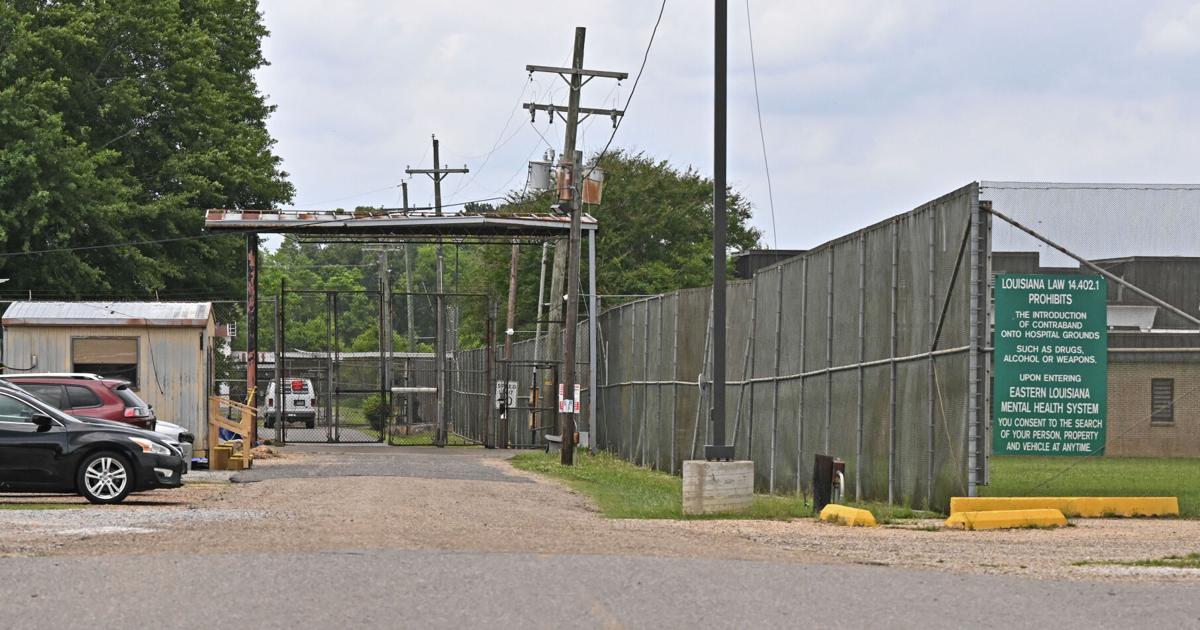Table of Contents
A growing number of people in Louisiana who are found incompetent to stand trial are caught in a backlog for mental health treatment — and many of them are being held in jail instead, sometimes for years. The number has steadily gotten worse in 2023.
When a person accused of a crime has a mental illness that hinders their ability to understand the charges against them or to participate in their legal defense, a judge rules them incompetent to stand trial and orders mental health care. In Louisiana, they are usually remanded to the Eastern Louisiana Mental Health System (ELMHS) in Jackson, the state’s only forensic psychiatric facility.
But there is no room at ELMHS, which already holds more than 600 patients and faces federal sanctions for overcrowding. And the waiting list is only growing.
Last December, 139 people were waiting for a place there, according to the Louisiana Department of Health. That number grew to 156 by this July.
At the end of October, the number was 194.
The patients awaiting treatment come from all over Louisiana: 38 from Jefferson Parish, 29 from East Baton Rouge Parish, 28 from Orleans Parish and 6 from Lafayette Parish.
It’s not clear exactly how many are in local jails, but health and criminal justice officials say it is most of them.
In some parishes, the number of patients waiting for treatment makes up a significant percentage of all defendants ruled incompetent to stand trial. In East Baton Rouge, for example, the 29 people on the waitlist make up about a quarter of all 112 people for whom court officials say trials are on hold.
With no treatment available, the defendants are in legal limbo. They are accused of sometimes serious crimes, but still legally presumed innocent and unable to face trial.
Louisiana’s inability to get defendants timely mental health treatment has landed it in legal trouble.
In 2016, the Louisiana Department of Health settled a federal lawsuit and agreed to provide behavioral health assessments and admit patients into treatment facilities within 15 days, among other rules.
But the state has fallen out of compliance with the settlement.
The number of defendants ruled incompetent grew sharply during the COVID pandemic. In 2020, 35 defendants were ruled incompetent to stand trial in East Baton Rouge Parish, and 41 were ruled incompetent in 2021. In 2022, the number grew to 73.
Health officials have noted a general increase in mental illnesses during the pandemic, and judges point out that the virus forced them to close courts for months, leading to a pileup of cases.
Jails are not equipped for competency treatment
Louisiana jails offer mental health treatment, though the quality and consistency of that treatment has often been called into question. Restoring patients to competency, however, is a specialized task tied to each defendant’s criminal proceedings, and mental health providers in jails say they are not equipped to handle them.
A warden for the East Baton Rouge Parish Sheriff’s Office, which operates the parish prison, said having people who should be getting specialized mental health treatment in prison causes issues for staff, but did not elaborate on how.
Turn Key is the Oklahoma-based company contracted for health care in the Baton Rouge jail. It also provides mental health care to inmates.
“We do not assist the state with those efforts due to the risk of compromise to the therapeutic relationship between our provider and the patient,” said Turnkey, the company that provides health care in the Baton Rouge jail in a statement.
Rebecca May-Ricks, Director of the Louisiana Mental Health Advocacy Service, said people found incompetent are supposed to be in a mental health facility, not jail.
“We know that jails are not good medical providers. They’re not equipped for that. That’s not what they’re designed to do,” she said. “We always want to put people in the least restrictive but most appropriate setting. We just don’t have a good alternative. We don’t have clinical, outpatient programs designed to deal with that. Other than Jackson we don’t have facilities that aren’t acute units.”
Difficulties fixing the problem
State health officials have been trying to build a second mental health facility for years, but have faced stiff headwinds.
Working with Harmony Behavioral Health Services, the state proposed a new location in East Baton Rouge Parish but rescinded the plans amid an outcry from nearby residents who feared for their safety and property values.
When the state tried to renovate a vacant hospital in East Feliciana Parish, it ran into similar opposition. Parish police jury members, the sheriff and the building inspector declined to approve a building permit for the former building on Grace Lane.
Harmony has sued the parish in U.S. District Court, saying the parish unfairly applied land use rules to target it. Three people who are waiting for treatment in ELMHS have filed a motion to join that lawsuit and to add LDH as a defendant.
“Obviously, these three plaintiffs that filed the intervention would like to get in a facility,” said Loren Kleinpeter, an attorney for Harmony Health and its owner, Collis Temple Jr. “You have these people who are really not competent sitting in prison. They’re not getting the daily mental health treatment they would be getting in Feliciana Forensic or in Harmony.”
With plans for the Harmony facility on hold indefinitely, LDH has turned to renovating a building at its Villa Feliciana Medical Complex to house psychiatric patients.
The department plans to issue a request for proposals next month to find a management company to staff and manage the building, which a spokesperson said is expected to be completed in May 2024.





More Stories
Thoughts as of late: on evolving, growing & that tiny voice inside
County Health Officials Report 17% Increase in Tuberculosis Cases
10 Most Nutrient-Rich Foods To Include In Your Diet